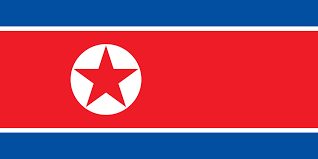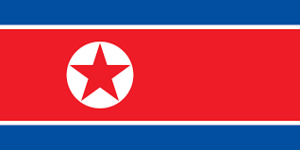With the intention to drastically enhance pressure on North Korea so that it is forced to abandon its pursuit of nuclear weapons, U.S. President Trump officially designated the rogue nation of being a state sponsor of terrorism.
Other nations that the U.S State Department identifies as those that have “repeatedly provided support for acts of international terrorism” are Sudan, Syria and Iran and now North Korea joins that list.
“Should have happened a long time ago,” Mr. Trump told reporters at the start of a cabinet meeting at the White House. The “highest level of sanctions” against Pyongyang would be enforced following the designation so that the regime there is forced to end its programs for developing nuclear and ballistic missiles, Trump said.
In case North Korea endangers the U.S., Trump has vowed of seeking a “complete denuclearization” in North Korea and has threatened to unleash “fire and fury” at the country. Earlier, a policy pf “strategic patience” was followed by the former U.S. President Barack Obama and was hopeful that Kim Jong-un, North Korea’s’ ultimate leader, would finally come to the negotiations table. This year, Trump has ended that policy.
“This just continues to tighten the pressure on the Kim regime,” Secretary of State Rex W. Tillerson said after Mr. Trump’s announcement, “all with an intention to have him understand that this is only going to get worse until you are ready to come and talk.”
Whether the war of words between Mr. Trump and Mr. Kim would be deepened or will the U.S. be able to get a powerful leverage to force North Korea to the negotiating table following the terrorism designation is still unclear.
Following the planting of a bomb on a South Korean passenger jet by North Korean agents in 1987, resulting in the death of 115 people abroad, the country had been put on Washington’s list of state sponsors of terrorism in 1988. The country has also for long been a pariah in the international community.
One of the agents who had been caught alive after the bombing, had confirmed that Kim Jong-un’s father - Kim Jong-il, had ordered the attack
20 years after the incident, an opportunity to recover a delicate nuclear deal where North Korea would come to an agreement agree to stop its nuclear program, was seen by President George W. Bush, and hence he had removed the country from the official State Department terrorism list.
In February this year, Kim Jong-nam, the half brother of Kim Jong-un, was murdered at the Kuala Lumpur International Airport and since then the demands for returning North Korea to the state-sponsored terrorism list have grown. A rare nerve agent, banned by international treaty, was used for the kill and North Korean agents were held responsible for plotting the murder.
The killing was cited as evidence for putting North Korea on the list of sponsors international terrorism by both Mr. Trump and Mr. Tillerson.
But whether the killing of a family members can be cited as being an act of international terrorism is being questioned by some veterans of North Korean diplomacy.
“It seems to me counterproductive, nutty and maybe tragically miscalculating,” said Robert Gallucci, who was the lead negotiator for the United States during nuclear talks with North Korea under President Bill Clinton.
(Source:www.nytimes.com)
Other nations that the U.S State Department identifies as those that have “repeatedly provided support for acts of international terrorism” are Sudan, Syria and Iran and now North Korea joins that list.
“Should have happened a long time ago,” Mr. Trump told reporters at the start of a cabinet meeting at the White House. The “highest level of sanctions” against Pyongyang would be enforced following the designation so that the regime there is forced to end its programs for developing nuclear and ballistic missiles, Trump said.
In case North Korea endangers the U.S., Trump has vowed of seeking a “complete denuclearization” in North Korea and has threatened to unleash “fire and fury” at the country. Earlier, a policy pf “strategic patience” was followed by the former U.S. President Barack Obama and was hopeful that Kim Jong-un, North Korea’s’ ultimate leader, would finally come to the negotiations table. This year, Trump has ended that policy.
“This just continues to tighten the pressure on the Kim regime,” Secretary of State Rex W. Tillerson said after Mr. Trump’s announcement, “all with an intention to have him understand that this is only going to get worse until you are ready to come and talk.”
Whether the war of words between Mr. Trump and Mr. Kim would be deepened or will the U.S. be able to get a powerful leverage to force North Korea to the negotiating table following the terrorism designation is still unclear.
Following the planting of a bomb on a South Korean passenger jet by North Korean agents in 1987, resulting in the death of 115 people abroad, the country had been put on Washington’s list of state sponsors of terrorism in 1988. The country has also for long been a pariah in the international community.
One of the agents who had been caught alive after the bombing, had confirmed that Kim Jong-un’s father - Kim Jong-il, had ordered the attack
20 years after the incident, an opportunity to recover a delicate nuclear deal where North Korea would come to an agreement agree to stop its nuclear program, was seen by President George W. Bush, and hence he had removed the country from the official State Department terrorism list.
In February this year, Kim Jong-nam, the half brother of Kim Jong-un, was murdered at the Kuala Lumpur International Airport and since then the demands for returning North Korea to the state-sponsored terrorism list have grown. A rare nerve agent, banned by international treaty, was used for the kill and North Korean agents were held responsible for plotting the murder.
The killing was cited as evidence for putting North Korea on the list of sponsors international terrorism by both Mr. Trump and Mr. Tillerson.
But whether the killing of a family members can be cited as being an act of international terrorism is being questioned by some veterans of North Korean diplomacy.
“It seems to me counterproductive, nutty and maybe tragically miscalculating,” said Robert Gallucci, who was the lead negotiator for the United States during nuclear talks with North Korea under President Bill Clinton.
(Source:www.nytimes.com)






